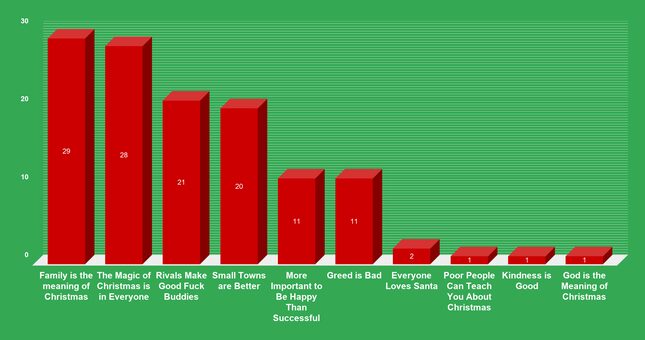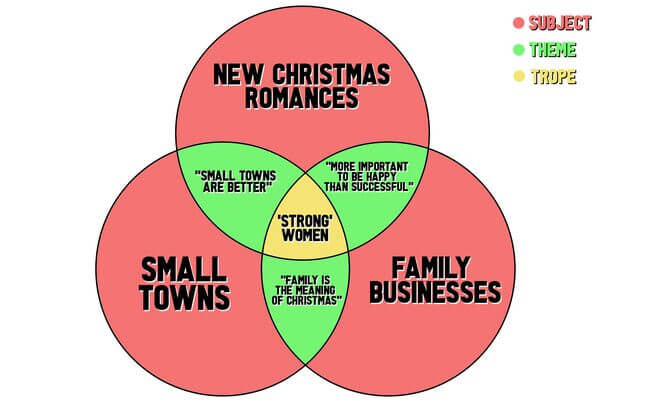
Illustration: Chelsea Beck
At some point in recent history, Christmas was mostly about watching people on the news beat each other up on Black Friday in their bloodthirsty quest for the latest singing, dancing, pissing, shitting Elmo doll. Thankfully, that has been shelved in service of a Christmas tradition that is much more American: Gluing your ass to the couch and mass-consuming thousands of Christmas movies on cable television.
Lifetime has long peddled its churn of made-for-TV movies, popularizing an entire genre of ripped-from-the-headlines crime thrillers like The Nanny Killer and I Almost Married a Serial Killer. As TiVo’s revolutionary digital recording technology gained popularity in the aughts, the quantity of these films seemed to increase. No longer were viewers tied down by strict airing schedules or the number of VCR tapes you could fit on a shelf. Cable channels like Lifetime, in turn, found themselves in a new age of viewership. Combined with the growing cash-grabbiness of American Christmastime, made-for-TV holiday schedules became a recurring format.
In 2005, Lifetime released two original Christmas movies—Deck the Halls and Recipe for a Perfect Christmas. After that, they maintained a steady rate of two to three original Christmas movies a year until 2012, when they released 12 original Christmas and holiday-themed movies. The network’s competitor, Hallmark Channel—which is Lifetime, if Lifetime was more concerned with peddling a wholesome, conservative, vaguely Christian outlook on the holiday—kept a similar pace.
As Christmas movies become more ubiquitous, so too does the frequency with which they pierce the mainstream media. Especially where they concern streaming services like Netflix, whose 2017 film A Christmas Prince has already seen two sequels. Perhaps the accessibility of Netflix over pay-cable channels is partially to blame, and the fact that all three Christmas Prince movies have been covered relentlessly by overly-online bloggers and Twitter users. Similarly, Netflix’s The Princess Switch, starring Vanessa Hudgens, created a social media firestorm for its inane plot and bonkers setting. (Its sequel, due sometime next year, is rumored to feature a third Vanessa Hudgens.)
Meanwhile, cable networks continue to beef up their schedules with more and more original holiday movies, even creating programming events to wrest some order from the seasonal chaos, creating their own entire pocket holiday cinematic universes, each with their own subtle character. Hallmark has turned its massive “Countdown to Christmas” into a parade of brands looking to cash in on the Christmas audience, with major sponsors this year, including McCormick cooking supplies, the 2019 Chrysler Pacifica, and Cost Plus World Market. They’ve even begun selling Christmas-themed romance novels and merchandise based on their movies, like this “Wine & Hallmark Movies” wine glass. Lifetime, too, runs its annual “It’s a Wonderful Lifetime” event (which has seen various names) 24/7, from the last week in November through the end of the year. Considering the number of hours in a day and average runtime of an hour-and-a-half, that’s about 16 movies per day and over 500 movies in total. That’s a lot of fucking Christmas!
I honestly didn’t know what my goal was when I started this journey. Was I searching for the meaning of Christmas, to warm my heart as hell freezes over and the world ends around me? Perhaps I wanted to understand my own predilection for movies about women who quit their day jobs to move back to their small South Dakota hometowns, where they fall in love with the hardware store owner’s son, only to have their romantic fling foiled by the fiancé who surprises her while on business for his finance job to purchase the hardware store and turn it into a chain restaurant. (I’d say it was mostly the latter!)
This year, with almost 100 original Christmas movies premiering on various cable and streaming platforms, I had a thought. What if I meticulously summarized, tagged, sorted, and parsed every single one of these movies in an effort to better understand this rapidly emerging cinematic field? The data I found in my investigation was shocking and often absurd.
To process this absolutely mind-boggling amount of information, I created a system of tagging the Christmas movies by subject and theme, based on summaries and trailers provided by various streaming services, channels, and information gathered from other outlets. (Like Good Housekeeping, whose master lists of movies were immensely useful.)
Below is the list of themes I used to sort each Christmas movie, based on collected data, as well as my own, incredibly long experience with the genre. (For some of the films, I assigned more than one theme.)
- Family is the meaning of Christmas
- The Magic of Christmas is in everyone
- Rivals make good fuck buddies
- Small towns are better
- It’s more important to be happy than successful
- Greed is bad
- Everyone loves Santa
- Poor people can teach you about Christmas
- Kindness is good
- God is the meaning of Christmas
As for the subjects of any given film, I pulled out 44 keywords and narrative tropes using summaries, trailers, and my own common sense as an extremely competent writer with a firm grasp on narrative storytelling. I then applied this data set to every single movie, graphed the frequency of each keyword, and cross-checked them with other recurring data points to create a comprehensive look at the most (and least!) popular Christmas movie trends in 2019.
However, nobody bakes a Christmas pie to stare at it, so why spend any more time discussing how this magnificent feat of mania, chaos, and my compulsive tendencies was accomplished? Let’s dive in!
On Themes:

The most popular theme this year was ‘Family is the meaning of Christmas,’ raking in a total of 29 movies.
The most popular theme this year was “Family is the meaning of Christmas,” raking in a total of 29 movies. This includes films where characters are reunited with their families, family businesses are in danger of closing, and families experience a tragedy that brings them closer. The least popular theme, however, is a three-way tie between “Poor people can teach you about Christmas,” “Kindness is good,” and “God is the meaning of Christmas.”
Surprisingly, I went into this thinking that movies featuring a random act of Christmas kindness would be more present in the dataset, which turned out to be completely wrong. Meanwhile, I was pleased to see that movies featuring rivals who fall in love at Christmastime, whether in corporate offices or hometown baking competitions, are strongly represented in this year’s lineup. As my colleague Kelly Faircloth put it, these movies are Harlequin category romances without the sex, so the popularity tracks.
Unsurprisingly, movies featuring a strong family connection as the central theme of the narrative were more present amongst Hallmark’s lineup, while Lifetime had over 95 percent of the films featuring a prominent, overtly sexy romance between rivals. It speaks to the disparity in their audiences! I’d also like to note how closely tied the themes “Small towns are better, “More important to be happy than successful,” and “Greed is bad” are. Keep this in mind as we move into subjects, where the meat of this dataset resides.
On Subjects:
Out of 279 applications to my subject categorization model, “New Christmas Romance” and “Strong Woman” are tied as the most popular subjects, consisting of over 12 percent of the category. These are expected, as both channels are catered mostly towards “women’s programming,” and the unspoken requirement of any Christmas movie is romance, even if it’s just between a woman and her Christmas tree or decorative Christmas mug collection!
Shockingly, the least popular themes were a staggering, 10-way tie between:
- Blizzards
- Christmas dinner
- Meddling Christmas parents
- Tour guides and tourists
- Christmas widow
- Christmas amnesia
- Christmas wedding
- Christmas orphan
- Christmas knight
- Christmas mailman
As for the number of times each subject appears per movie, I’ve counted that, too! But this time, let’s switch it up with another bar graph. Math!

On Strong Women in Small Towns Fucking Hot Farmers
An unsurprising trend this season concerns “strong,” affluent women who find themselves marooned in small towns across America. Often, they are snowed in on a work trip or visiting family for the first time since taking that high-powered corporate job. This crisis, which sets in motion a chain of Christmas events, usually culminates in the realization for said women that maybe small towns aren’t that bad, and maybe they should quit those fancy jobs and move back to the farm. Hot guys live on farms! And besides, ambition will make them both ugly and a bad daughter, which would also render them unlikeable Christmas movie characters. It’s a hard-knock life!
As it stands, Hallmark movies especially traffic in numerous “old world”-feeling values surrounding family, faith, and a woman’s supposed lot in life. Main characters in these movies, usually characterized by traits like “blonde, white, and hopelessly romantic,” are often ruined by their ambitions and cannot go more than three minutes without being reminded by the supernatural forces of the writing room that life would have been easier if they married their high school sweetheart-turned-mechanic, who is a single dad now with a crucifix hanging around his thick, muscular neck.
While collating the above data, I also discovered a frightening trend amongst movies featuring the “strong woman” trope: Over 60 percent of them also featured romance as a defining plot point. The chances for this increased in movies where the theme is either “small towns are better” and/or “it’s more important to be happy than successful.” Even worse, the data consistently proves that romantic movies aren’t even the most popular category this year. Jinkies!

The conspiracy thickens: In comparing datasets from Hallmark’s lineup and Lifetime’s lineup, I found that 95 percent of movies with the theme “rivals make good fuck buddies” are being produced by Lifetime. (This is also true for movies involving country music stars, which felt notable enough to document here.) These movies are more overtly sexy and usually include some amount of bodily contact in promotional trailers. Conversely, the majority of Hallmark’s romantic lineup featured quaint small towns and bumbling “old flames,” with the sexiness dialed back to minuscule amounts. While women in Lifetime movies are hooking up with their office rivals, the women in Hallmark movies are dutifully holding hands with big, strong farmers they’re contemplating leaving those same office jobs for.
On the Growing Number of Legitimately Famous People in Christmas Movies
Did you know that Kelly Rowland was starring in Merry Liddle Christmas, a movie about an “ambitious tech entrepreneur” locked in hot and sexy new romance with a neighbor? Or that Ashanti was the star of A Christmas Winter Song, where she meets a homeless former jazz singer “who needs a second chance”? I had no fucking clue, understandably, considering the staggering marketing feat of somehow conveying the (mostly) distinct plot lines of 100 original Christmas movies.
Other incredibly famous people one might normally see as “above” cable Christmas movies, or at least too early into their post-network series irrelevancy to consider doing one include Patti Labelle, Vanessa Williams, Kristin Davis, Rob Lowe, and Kiernan Shipka. As for the other famous people populating the Christmas airwaves this year: Kristen Chenoweth, Candace Cameron Bure, Keisha Knight Pulliam, Kim Fields, Rachel Leigh Cook, Tamera Mowry, Chad Michael Murray, Kathy Lee Gifford, and Jackée Harry. That’s a lot of famouses!
Emerging Trends: Horny Country Music Stars
There are exactly six movies featuring country music stars premiering this year. In Sweet Mountain Christmas, a blizzard derails a country music star during a visit to her bumbling hometown, where she falls in love with a sexy snowplow driver. In another, The Road Home For Christmas, rival country musicians fall in love on a sexy Christmastime road trip. There’s even a movie, Our Christmas Love Song, where a country musician is accused of plagiarism. She flees to her hometown to escape the press, where she falls into the arms of an “old flame.” (Remember what I said about “strong” women finding love in their hometowns?)
The most ridiculous of these examples, of course, is Hallmark’s Christmas at Dollywood, where a tour guide at country music star Dolly Parton’s sprawling fun land falls in love with the producer of the 20th Anniversary Smoky Mountain Christmas Festival. Meta!
Falling Trends: Horny Royals in Christmas Countries
Considering the popularity of Netflix’s The Christmas Prince and The Princess Switch, I expected more movies about horny Christmas royals to spring up on the cable networks. This was not so! In fact, neither Hallmark or Lifetime are producing royal-themed Christmas movies. The only movie in this genre is the Netflix sequel, A Christmas Prince: The Royal Baby. Unfortunately, it isn’t yet clear if Christmas movie audiences are bored of the genre or networks are afraid of the extremely competitive sub-category. Either way, I predict they will be all but extinct this time next year!
Something Feels Off About These Hanukkah Movies
There are three Hanukkah-“themed” Christmas movies premiering across Lifetime and Hallmark this year. In Holiday Date, a woman is left scrambling when her boyfriend breaks up with her before she heads home for Christmas. Her friend takes his place as her stand-in boyfriend. Wackiness ensues, according to Hallmark, when she discovers he’s actually Jewish and celebrating Hanukkah! Meanwhile, Double Holiday sees a woman who must scramble to throw a Hanukkah party for her corporate overlords with her “office rival.” In Mistletoe & Menorahs, a “toy company executive” has to read up on Hanukkah traditions so she can secure a “major account” with some different corporate overlords.
In all three films, Hanukkah is employed as the “scary, disruptive” experience for the characters, each having to deal with the “wackiness” that ensues when they encounter people who don’t celebrate Christmas. I’d also like to hone in on the fact that two of the three Christmas movies take place in corporate offices, and in one, a woman must learn about Hanukkah to impress some executives at a toy company. Exactly how many Jewish people worked on these films, and how many executives green-lit Mistletoe & Menorahs?
Collecting this data made me want to write my own Christmas movie. Lifetime, Hallmark, if you’re listening, here’s my pitch: A young blogger goes on a reporting assignment to a remote hot chocolate brewing competition in rural Vermont. There, she runs into her ex, a renowned journalist for the New York Times, who is trying to profile the same, elusive chocolatier she’s attempting to track down. In the process, she falls for his charming, enigmatic son, only to find out in the climactic twist that the chocolatier is her long-lost father, who left her mother before she was born.
And while this experience mostly caused me a series of increasingly complex stress dreams, in which my Christmas souvenir shop was at threat of closing because the hot executive wanted to make it a cupcake store slash tanning salon, it was also illuminating! Just like the enigmatic blogger, who learns through brother-fucking and chocolate the true meaning of Christmas; I learned that Christmas—like anything else in our lives—is just a medium through which writers channel their sexual frustrations, petty grievances, and fantasies. Like Lord of the Rings adjacent fantasy stories, where elves and wizards battle primordial entities hell bent on the destruction of the planet; or spy movies, where the buff English actor has to dodge some sexy lasers or else the nuclear bomb will explode!
It’s also interesting to imagine some future iteration of our civilization finding the Hallmark Christmas movie archive. I wonder what they might think this holiday actually was, long after Jesus, his manger, and the Happy Honda Days sales event have been forgotten. Maybe space colonies on Mars will stage annual “Hallmark” festivals, where young colonists dress up in traditional 21st century peacoats and scarves, sort of like Renaissance Festivals or the Dickens Fair.